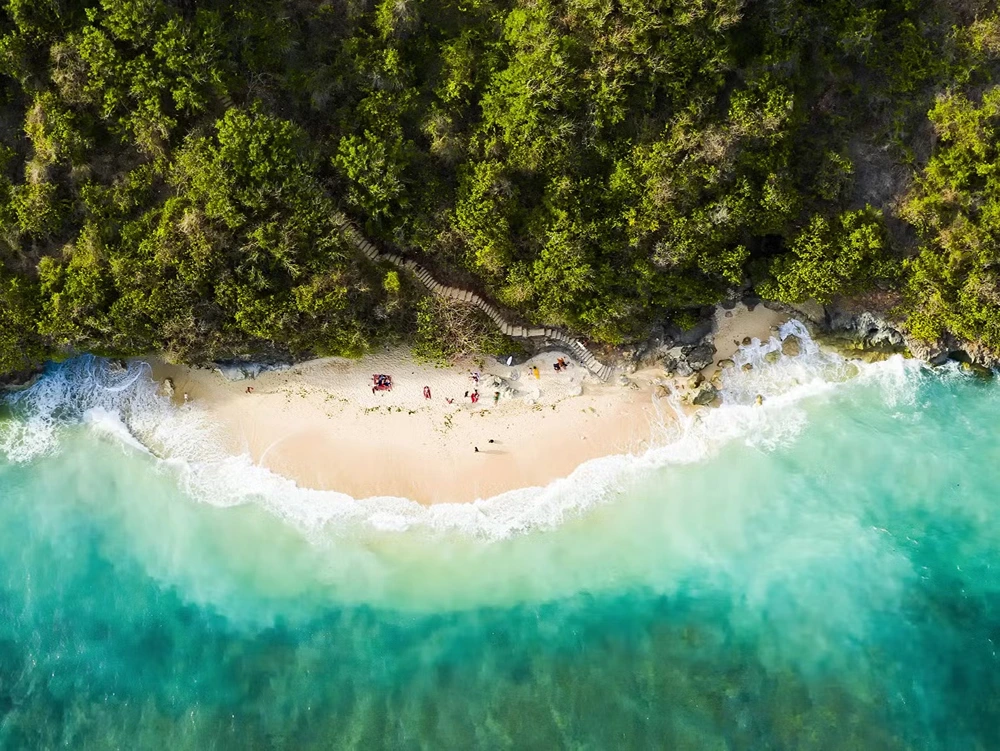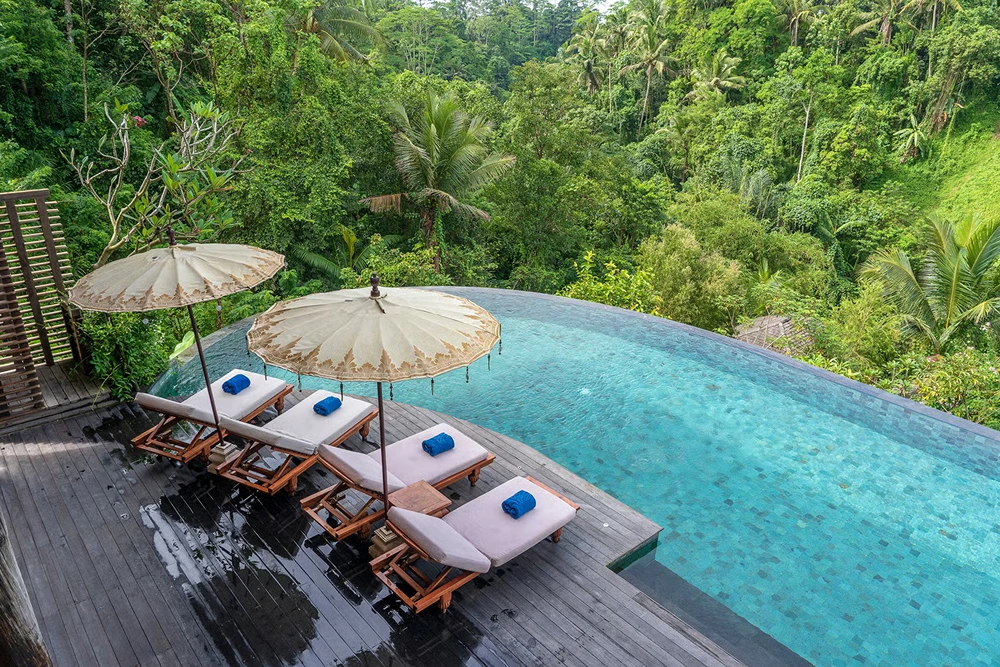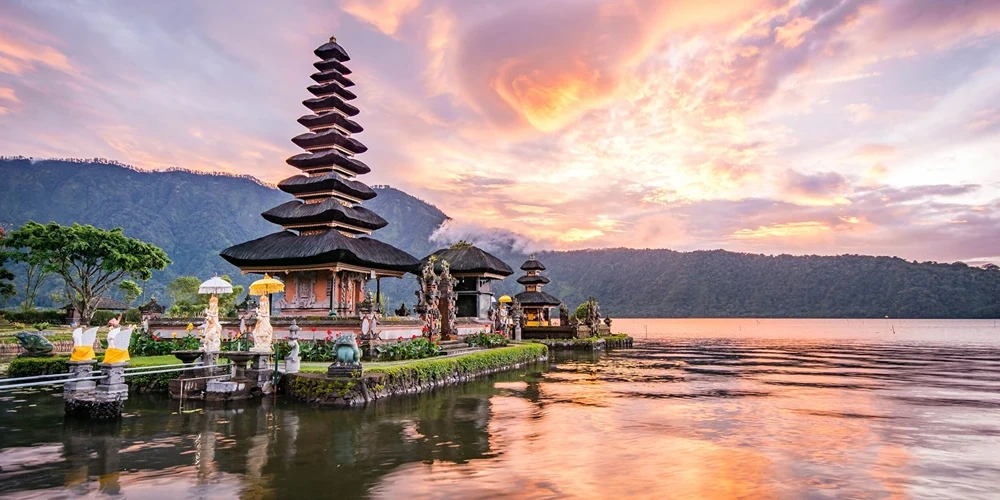Key highlights of Bali:
- Stunning beaches and world-class surfing spots
- Lush landscapes including iconic rice terraces
- Rich cultural heritage with numerous temples and traditional arts
- Vibrant wellness and yoga scene
- Diverse cuisine ranging from local delicacies to international fare
- Luxurious resorts and budget-friendly accommodations
Travel Resources
Before embarking on your Balinese adventure, consider these essential resources:
- Flights: Find affordable flights to Bali to start your journey.
- Insurance: Ensure a worry-free visit with comprehensive travel insurance.
- Car Rental: Rent a car in Bali for exploring beyond the tourist hotspots.
- Tours: Discover Bali’s hidden gems with our curated selection of tours.
- Packing List: Don’t forget essentials like lightweight clothing, reef-safe sunscreen, and a universal power adapter!

Some History First
Bali’s rich history has shaped its unique culture and traditions:
- Pre-historic times: Evidence of early settlements dating back to 2000 BCE
- 8th – 10th centuries: Influence of Indian and Javanese Hindu cultures
- 11th century: Establishment of the Balinese Hindu religion
- 16th – 19th centuries: Various Balinese kingdoms and Dutch colonial influence
- 1949: Bali becomes part of independent Indonesia
- 1970s onwards: Development of tourism industry
Notable historical events:
- Arrival of Majapahit Empire (14th century)
- Dutch colonization (1840s)
- Japanese occupation during World War II (1942-1945)
- Indonesian independence and integration of Bali (1949)
- Bali bombings (2002 and 2005) and subsequent recovery
Bali Today
Modern Bali balances tradition with the demands of a popular tourist destination:
- Population: Approximately 4.3 million
- Economy: Primarily driven by tourism, agriculture, and handicrafts
- Culture: Strong preservation of traditional arts, crafts, and religious practices
- Environment: Efforts to maintain balance between development and conservation
- Technology: Growing digital nomad and startup scene
Key sectors:
- Tourism and hospitality
- Agriculture (rice, coffee, tropical fruits)
- Arts and handicrafts
- Wellness and spiritual retreats
Is Bali Safe?
Bali is generally considered safe for tourists, but it’s important to exercise common sense and stay informed about local conditions. Here are some safety considerations:
- Be cautious in crowded areas and watch out for petty theft
- Traffic safety: Be extra careful when crossing streets or if renting a scooter
- Respect local customs and dress modestly, especially near temples
- Natural hazards: Be aware of strong currents at some beaches and the potential for volcanic activity
- Health: Take precautions against mosquito-borne illnesses and drink only bottled water
- Emergency numbers: 112 for general emergencies, 118 for ambulance, 110 for police
Where is Bali?
Bali is strategically located in the Indonesian archipelago:
- Part of the Lesser Sunda Islands
- Located east of Java and west of Lombok
- Coordinates: 8°S 115°E
- Size: Approximately 5,780 km² (2,230 sq mi)
- Capital city: Denpasar (southern Bali)
Fun fact: Bali is the only Hindu-majority province in Indonesia, which is the world’s largest Muslim-majority country.
Latest Articles
From The Area
Nothing found.
What is the Best Time to Visit Bali?
Bali has a tropical climate with two distinct seasons:
- Dry season (April to October):Best time for most travelers
- Less rainfall and lower humidity
- Ideal for outdoor activities and beach time
- Peak tourist season: July and August
- Wet season (November to March):
- Higher chance of rainfall, especially in December-February
- Lush green landscapes
- Fewer crowds and lower prices
Best times to visit popular areas:
- Southern Bali (Kuta, Seminyak, Uluwatu): May to September
- Ubud and central Bali: April to September
- Northern and eastern Bali: May to September
Tip: Consider visiting during shoulder seasons (April-June and September-October) for a balance between good weather and smaller crowds.
How to Get to Bali & Around
Bali offers various transportation options for both arrivals and getting around the island:
Getting to Bali:
- By air: Ngurah Rai International Airport (DPS) in Denpasar is the main gateway
- Direct flights from many Asian cities and some long-haul destinations
- Domestic flights connect Bali to other Indonesian islands
- By sea: Ferries connect Bali to neighboring islands like Java and Lombok
Getting around Bali:
- Car rental: Provides flexibility but be prepared for traffic in popular areas
- Scooter rental: Popular among tourists, but be cautious and ensure proper insurance
- Taxis and ride-hailing: Apps like Gojek and Grab are widely used
- Private drivers: Affordable option for day trips or multi-day tours
- Shuttle buses: Connect major tourist areas
- Public buses: Limited but available for budget travelers
Pro tip: For stress-free exploration, consider hiring a private driver who knows local roads and can provide cultural insights.
Things to Do in Bali
Bali offers an incredible array of activities and attractions:
- Visit ancient temples: Explore Uluwatu, Tanah Lot, and Besakih temples
- Explore Ubud: Discover art galleries, the Monkey Forest, and scenic rice terraces
- Beach hopping: Relax on famous beaches like Kuta, Seminyak, and Nusa Dua
- Water sports: Try surfing, snorkeling, or diving in Bali’s crystal-clear waters
- Cultural experiences: Watch traditional dance performances and visit local markets
- Wellness and yoga: Join a retreat or take classes in Ubud or Canggu
- Mount Batur trek: Hike an active volcano for a stunning sunrise view
- Visit Nusa Islands: Explore the beautiful nearby islands of Nusa Penida, Nusa Lembongan, and Nusa Ceningan
- Tegalalang Rice Terrace: Witness the iconic UNESCO-listed landscapes
- Balinese cooking class: Learn to prepare local dishes using traditional methods
Don’t miss: Experiencing a traditional Balinese ceremony or festival for a deep dive into local culture.
Where To Stay In Bali
Bali offers a wide range of accommodation options to suit every budget and preference:
Luxury:
- Four Seasons Resort Bali at Sayan (Ubud)
- COMO Uma Canggu
- The Mulia (Nusa Dua)
Mid-range:
- Alila Manggis (East Bali)
- Chapung Sebali (Ubud)
- Montigo Resorts Seminyak
Budget:
- Kosta Hostel (Seminyak)
- Artotel Haniman (Ubud)
- Bread & Jam Hostel (Kuta)
Unique stays:
- Bambu Indah (eco-luxury resort in Ubud)
- Bubble Hotel Bali (transparent bubble tents)
- Bali Eco Stay (off-grid bungalows in central Bali)
Popular areas to stay:
- Seminyak: Trendy area with upscale restaurants and beach clubs
- Ubud: Cultural heart of Bali, surrounded by rice fields and forests
- Canggu: Hip surf spot with a growing digital nomad community
- Uluwatu: Dramatic clifftop location with luxury resorts
- Nusa Dua: Gated area with pristine beaches and family-friendly resorts

What To Eat In Bali
Balinese cuisine is a delightful mix of Indonesian, Chinese, and Indian influences:
Must-try dishes:
- Babi Guling: Succulent spit-roasted pig
- Nasi Campur: Mixed rice dish with various side dishes
- Bebek Betutu: Slow-cooked duck in banana leaves
- Lawar: Minced meat dish with vegetables and spices
- Sate Lilit: Spiced minced seafood on lemongrass skewers
Where to eat:
- Warungs: Small family-owned eateries offering authentic local food
- Night markets: Try a variety of street food and local specialties
- Seafood restaurants: Enjoy fresh catches at Jimbaran Beach
- Organic cafes: Popular in Ubud and Canggu for healthy, plant-based options
- International cuisine: Wide variety available in tourist areas
Pro tip: Don’t miss trying Kopi Luwak, the famous (and controversial) civet coffee, but ensure it’s from an ethical source.
Entry & Exit Requirements
Visitors to Bali must comply with Indonesia’s entry regulations:
- Visa: Requirements vary based on nationality
- Many countries are eligible for Visa-free entry for stays up to 30 days
- Visa-on-Arrival available for some nationalities (extendable to 60 days)
- E-Visa option available for longer stays or business purposes
- Passport: Must be valid for at least 6 months beyond your planned stay
- Health: Proof of COVID-19 vaccination may be required (check current regulations)
- Customs: Be aware of restricted and prohibited items
Important: Always check the most up-to-date information from official sources before your trip, as requirements may change.
What To Pack For Your Trip
Ensure a comfortable and enjoyable stay in Bali by packing these essentials:
- Clothing:
- Lightweight, breathable fabrics
- Modest attire for visiting temples (sarongs are often provided)
- Swimwear and beach cover-ups
- Footwear:
- Comfortable walking sandals
- Flip-flops
- Water shoes for rocky beaches
- Sun protection: Hat, sunglasses, and reef-safe sunscreen
- Insect repellent
- Travel adapter (Indonesia uses 230V, 50Hz with Type C and F plugs)
- Reusable water bottle with filter
- Basic first-aid kit and any necessary medications
- Waterproof phone case or dry bag
- Light rain jacket (especially if visiting during the wet season)
Pro tip: Pack light and leave room for souvenirs. Many items can be purchased locally at affordable prices.
Remember to respect local customs and dress modestly, especially when visiting temples or rural areas. Balinese culture is deeply spiritual, so being mindful of traditions will enhance your experience and show respect to your hosts.
FAQs
Check the visa policy based on your nationality. Some countries are eligible for visa-free entry.
Don’t miss Tanah Lot, Besakih, and Tirta Empul.
It’s recommended to drink bottled or boiled water to avoid stomach upset.


